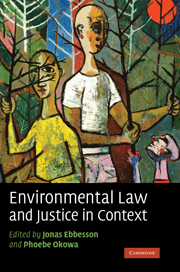Book contents
- Frontmatter
- Contents
- List of contributors
- Preface and acknowledgments
- 1 Introduction: dimensions of justice in environmental law
- Part I The notion of justice in environmental law
- Part II Public participation and access to the judiciary
- Part III State sovereignty and state borders
- Part IV North–South concerns in global contexts
- 15 Competing narratives of justice in North–South environmental relations: the case of ozone layer depletion
- 16 Climate change, global environmental justice and international environmental law
- 17 Justice in global environmental negotiations: the case of desertification
- Part V Access to natural resources
- Part VI Corporate activities and trade
- Index
- References
16 - Climate change, global environmental justice and international environmental law
from Part IV - North–South concerns in global contexts
Published online by Cambridge University Press: 28 June 2009
- Frontmatter
- Contents
- List of contributors
- Preface and acknowledgments
- 1 Introduction: dimensions of justice in environmental law
- Part I The notion of justice in environmental law
- Part II Public participation and access to the judiciary
- Part III State sovereignty and state borders
- Part IV North–South concerns in global contexts
- 15 Competing narratives of justice in North–South environmental relations: the case of ozone layer depletion
- 16 Climate change, global environmental justice and international environmental law
- 17 Justice in global environmental negotiations: the case of desertification
- Part V Access to natural resources
- Part VI Corporate activities and trade
- Index
- References
Summary
[W]e need to be constantly skeptical of the universalist ‘we’ who talks loftily about the principles of global justice.
Andrew HurrellI don't find justice either a useful decision-making tool or a recognizable objective for international law.
Judge Rosalyn Higgins[I]nternational law exists as a promise of justice.
Martti Koskenniemi[T]he future will see increasing efforts to form international [environmental] regimes, often with profound effects on nonparticipants…Principles of global justice…are going to be among the most important topics of the new world.
Christopher D. StoneIntroduction
Climate change is a global problem. The emission of greenhouse gases or destruction of carbon sinks anywhere in the world affects the Earth's climate. Similarly, while the nature and severity of impacts may vary geographically, no state can insulate itself from the consequences of global climate change. Climate change is also an inter-temporal problem. The actions and omissions of the present will have implications for climatic conditions in the future, just as activities undertaken in the past have had impacts on today's climate. Historically, emissions of greenhouse gases have been far greater in the industrialized countries. The emissions of Northern countries still significantly exceed those of developing countries, although the emissions share of the developing world and the emissions of some large developing countries are projected to rise sharply over the next two decades. The impacts of climate change are likely to disproportionately affect Southern, developing countries, many of which are especially vulnerable to such impacts.
- Type
- Chapter
- Information
- Environmental Law and Justice in Context , pp. 316 - 332Publisher: Cambridge University PressPrint publication year: 2009
References
- 5
- Cited by



